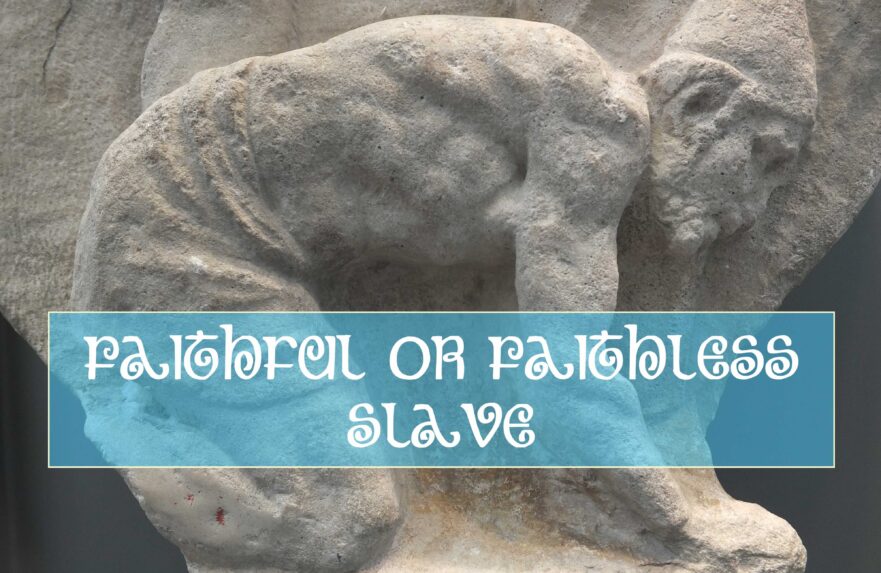How to cite this article:
Joshua N. Tilton and David N. Bivin, “Faithful or Faithless Slave,” The Life of Yeshua: A Suggested Reconstruction (Jerusalem Perspective, 2024) [https://www.jerusalemperspective.com/29584/].
Matt. 24:45-51; Luke 12:35-38, 41-46
(Huck 158, 226; Aland 203, 297; Crook 238, 240, 339)[1]
יִהְיוּ מָתְנֵיכֶם חֲגֻרִים וְנֵרוֹתֵיכֶם דְּלוּקִים כִּבְנֵי אָדָם מְצַפִּים לְרַבָּם אֵימָתַי שֶׁיַּחְזוֹר מִבֵּית הַמִּשְׁתֶּה כְּדֵי שֶׁכְּשֶׁבָּא וְדוֹפֵק יִפְתְּחוּ לוֹ אַשְׁרֵי אוֹתָם הָעֲבָדִים שֶׁכְּשֶׁבָּא רַבָּם יִמְצָאֵם עֵרִים אֲפִילּוּ בָּאַשְׁמוֹרֶת הַשְּׁנִיָּיה וַאֲפִילּוּ בָּאַשְׁמוֹרֶת הַשְּׁלִישִׁית יָבוֹא וְיִמְצָאֵם כָּךְ אַשְׁרֵיהֶם
וּמִי הוּא הָעֶבֶד הַנֶּאֱמָן וְהַפִּקֵּחַ שֶׁהִפְקִיד רַבּוֹ עַל בֵּיתוֹ לִיתֵּן לָהֶם מָזוֹן בִּזְמַנּוֹ אַשְׁרֵי אוֹתוֹ הָעֶבֶד שֶׁכְּשֶׁבָּא רַבּוֹ יִמְצָאֵהוּ עוֹשֶׂה כָּךְ אָמֵן אֲנִי אוֹמֵר לָכֶם עַל כָּל מַה שֶּׁיֵּשׁ לוֹ יַפְקִדֵהוּ וְאִם יֹאמַר אוֹתוֹ הָעֶבֶד בְּלִבּוֹ מְאַחֵר רַבִּי לָבוֹא וְיַתְחִיל לְהַכּוֹת אֶת הָעֲבָדִים וְאֶת הָאֲמָהֹת לֶאֱכוֹל וְלִשְׁתוֹת וּלְהִשְׁתַּכֵּר יָבוֹא רַבּוֹ שֶׁלְּאוֹתוֹ הָעֶבֶד בְּיוֹם שֶׁאֵינוֹ מְצַפֶּה וּבְשָׁעָה שֶׁאֵינוֹ יוֹדֵעַ וְיִגְזְרֵהוּ לִשְׁנַיִם וְיִתֵּן חֶלְקוֹ עִם מְחוּסְּרֵי אֲמָנָה
“Make sure your belt is buckled and your lamps are lit, like people waiting for their master at whatever time he might return from the wedding feast. That way, when he comes home and knocks on the door, they’ll be able to open it for him. Blessed are those slaves whom, when their master arrives, he will find awake. Even if he comes in the second watch of the night, or even in the third, and finds them thus, blessed are they!
“So who is the faithful slave, the sensible one, whom his master set in charge over his household to give them food in its time? Blessed is that slave whom, when his master comes, he will find doing thus. Indeed, I can assure you that he will place him in charge of all he has. But if that slave says to himself, ‘My master is slow in coming!’ and he begins to beat the male and female slaves, to eat and drink and to get drunk, then the master of that slave will come on a day he doesn’t expect and in a moment he cannot guess. The master will slice him in two and set his portion with those who lacked faith.”[2]
| Table of Contents |
|
3. Conjectured Stages of Transmission 5. Comment 8. Conclusion |
Reconstruction
To view the reconstructed text of Faithful or Faithless Slave click on the link below:
Paid Content
Premium Members and Friends of JP must be logged in to access this content: Login
If you do not have a paid subscription, please consider registering as a Premium Member starting at $10/month (paid monthly) or only $5/month (paid annually): Register
One Time Purchase Rather Than Membership
Rather than purchasing a membership subscription, you may purchase access to this single page for $1.99 USD. To purchase access we strongly encourage users to first register for a free account with JP (Register), which will make the process of accessing your purchase much simpler. Once you have registered you may login and purchase access to this page at this link:
Conclusion
Faithful or Faithless Slave is best understood as a post-resurrection saying of Jesus addressed to his disciples to prepare them for the new circumstances they were about to experience following his ascension. In order for them to understand what his ascension to heaven would mean, Jesus framed it in terms of Moses’ ascension to the summit of Mount Sinai in order to receive the Torah. Just as the Israelites’ faithfulness was tested during the time of Moses’ absence, Jesus knew that during his absence his disciples’ faithfulness would be tested. The Israelites of the generation of the desert failed the test. They grew impatient for Moses to return and exploited what they perceived as delay as an opportunity for self-indulgence. Rather than emulate the rebellious Israelites, Jesus encouraged his disciples to emulate Moses, the faithful slave in all God’s house.
 Click here to return to The Life of Yeshua: A Suggested Reconstruction main page.
_______________________________________________________
Click here to return to The Life of Yeshua: A Suggested Reconstruction main page.
_______________________________________________________
- [1] For abbreviations and bibliographical references, see “Introduction to ‘The Life of Yeshua: A Suggested Reconstruction.’” ↩
- [2] This translation is a dynamic rendition of our reconstruction of the conjectured Hebrew source that stands behind the Greek of the Synoptic Gospels. It is not a translation of the Greek text of a canonical source. ↩

































































































